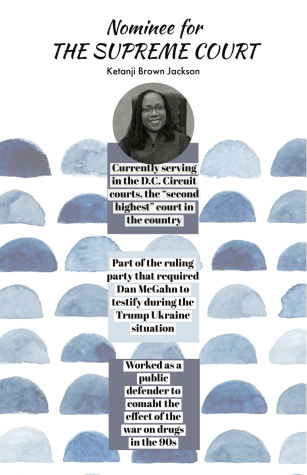Balancing the court
With the announcement of the retirement of Supreme Court Justice Stephen Breyer, President Biden has promised to balance the previously askew political alignment within our top court.
Justice Stephen Breyer announced on Jan. 27 that he will be retiring when the court rises for summer recess this year. Breyer, with more than 27 years of service on the Supreme Court, is one of the three remaining liberal justices on the court after the three conservative appointments during the Trump Presidency. Many wonder what the future of the highest court in our country will look like as many significant cases are being brought to trial like Roe v. Wade.
Breyer’s impact on the court through the two decades of his appointment has gone seemingly overlooked. As a staunch defender of a nonpartisan judiciary, he has led the charge in many monumental decisions from protection of abortion rights to affirmative action and led the way for many of his fellow justices to follow suit. He has carried his position on our highest court with immense caution, understanding the impact of his decisions.
Breyer has long believed that the interpretation of the constitution should change with the times, putting him at odds with the conservative judges who feel that it is necessary to uphold the exact beliefs of the founders. His promise to adapt with the times has been upheld, as he has openly spoken to how he felt the death penalty in the United States has become “arbitrary and unconstitutional.”
He is most well known for his decision in 2016 to cover a case surrounding a Texas law that challenged the precedent set by Roe Vs. Wade on the topic of abortion rights. The proposed law closed almost half of all abortion clinics in the state without justification to back up the state’s claim that it was to protect women’s health and safety. The proposed law was ruled unconstitutional with a final word from Breyer on the ruling, reaffirming the rights of US women to terminate pregnancies.
The Biden administration promised during the campaign trail to nominate a black woman for the vacancy. They have delivered on that promise with the announcement of the nominee coming Feb. 25, with Ketanji Jackson Brown being selected to fill the vacancy. She has been a previous candidate and her chances to get approved by the senate are very promising.

Many speculate whether President Biden will propose to expand the court to attempt to balance out the right leaning alignments in the court. However, Justice Breyer himself has spoken out against the notion of court packing. As he explained, expanding the structure of the court would undermine the notion that it is an institution not influenced by politics, holding up the constitution, not political ideologies.
President Biden himself stated in 2020 that he was not a fan of the idea of court packing, as he recognized that “Presidents come and go. Supreme Court justices stay for generations.”
Your donation will support the student journalists of West High School. Your contribution will allow us to purchase Scholarship Yearbooks, newsroom equipment and cover our annual website hosting costs.

(she/her) She is a senior this year, and she is also the Co-Managing Editor and Podcast Editor for web this year. In her free time, you can find her at...


